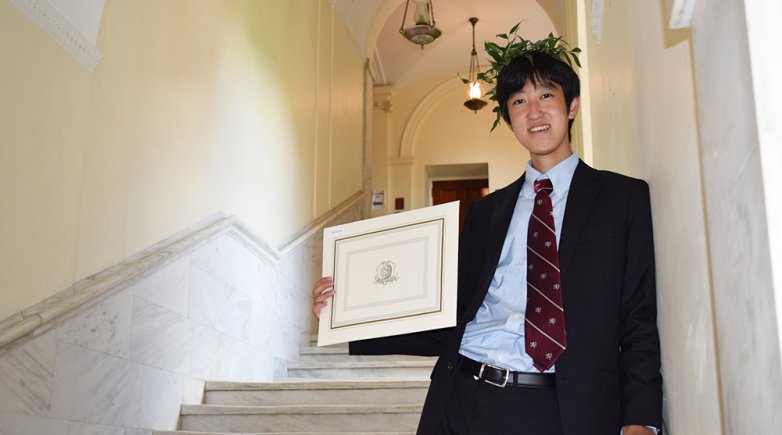Kevin Cong '22 wins gold at International Math Olympiad
New grad is the latest in a rich history of Exeter math standouts to shine in the annual competition.
Kevin Cong '22 helped the United States to a third-place team finish at the 63rd IMO.
Kevin Cong '22 shined among the brightest young mathematicians in the world, claiming a gold medal at the 63rd International Mathematical Olympiad in Oslo, Norway.
Cong earned 36 of a possible 42 points to tie for 23rd place overall among nearly 600 competitors. Only the top 40 finishers were awarded golds.
The six-person team from the United States finished in third place behind China and South Korea. All six competitors from China earned perfect scores in the two-day program.
Cong, bound for Harvard in the fall, earned his spot on the American roster by winning a gold medal during the national competition this spring.
“My journey to becoming a member of the U.S. IMO team has been a long and enlightening one,” Cong wrote in an email. “Over the years, I've been blessed to have the support of many, from my parents to teachers and mentors. One of these mentors has been Mr. (Zuming) Feng, who I met both as my math instructor and adviser to (the Exeter) Math Club. Math Club was one of the first clubs I joined when I arrived on campus four years ago, and I would come to find an amazing community in it.”
“Under Mr. Feng's guidance in problem-solving sessions and organizing events, I've learned much — both in new math concepts and other important skills such as being able to organize events — and also made lifelong friends.”
Feng finished a three-decade tenure in the PEA Math Department in 2021, and his influence on Exonian math students and the national IMO team over the years is far-reaching. Several Exeter students have represented the U.S. and other nations in the competition, and Exonians have helped the U.S. to victory seven times. In 2018, James Lin ’18 turned in one of only two perfect scores among 594 competitors to steer the U.S. to the win. Alex Song ’15, representing Canada, is in the IMO Hall of Fame and remains the only competitor to win five golds in the event.
The IMO recognizes team success, but the participants work on the problems individually. Each has nine hours — split into two sessions over two days — to crack six problems, with judges grading work on each problem on a zero-to-seven scale.
